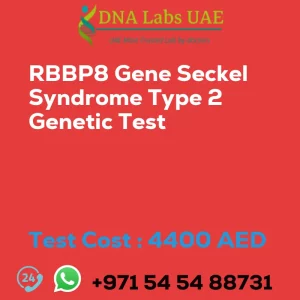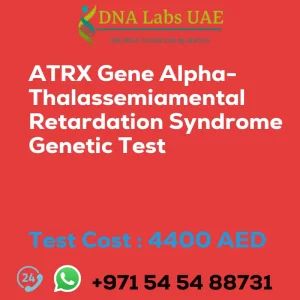EP300 Gene Rubinstein-Taybi syndrome Genetic Test
At DNA Labs UAE, we offer the EP300 Gene Rubinstein-Taybi syndrome Genetic Test at a cost of AED 4400.0. This test is designed to diagnose Rubinstein-Taybi syndrome, a rare genetic disorder associated with mutations in the EP300 gene.
Test Components
- Price: 4400.0 AED
- Sample Condition: Blood or Extracted DNA or One drop Blood on FTA Card
- Report Delivery: 3 to 4 Weeks
- Method: NGS Technology
- Test type: Dysmorphology
- Doctor: Pediatrics
- Test Department: Genetics
Pre Test Information
Before undergoing the EP300 Gene Rubinstein-Taybi syndrome NGS Genetic DNA Test, it is important to provide the clinical history of the patient. A genetic counseling session will also be conducted to draw a pedigree chart of family members affected by the syndrome.
Test Details
The EP300 gene is responsible for producing a protein called E1A-binding protein p300, which plays a crucial role in the regulation of gene expression. Mutations in the EP300 gene are associated with Rubinstein-Taybi syndrome (RTS), a rare genetic disorder.
Rubinstein-Taybi syndrome is characterized by physical and intellectual disabilities, distinctive facial features, broad thumbs and toes, and growth delays. It is an autosomal dominant disorder, meaning that a mutation in one copy of the EP300 gene is sufficient to cause the condition.
NGS (Next-Generation Sequencing) genetic testing is used to analyze multiple genes or the entire genome simultaneously. In the context of Rubinstein-Taybi syndrome, NGS genetic testing can identify mutations or variations in the EP300 gene that may be responsible for the disorder.
To perform the NGS genetic testing for Rubinstein-Taybi syndrome, a DNA sample is obtained, usually through a blood or saliva sample, from the individual suspected of having the condition. The DNA is then sequenced using NGS technology to identify any mutations or variations in the EP300 gene.
It is important to note that NGS genetic testing may not detect all possible mutations in the EP300 gene due to technological limitations. Therefore, a negative test result does not completely rule out the presence of a mutation in the EP300 gene.
Genetic testing should always be interpreted in conjunction with clinical evaluation and family history. The results of the test can help confirm a diagnosis of Rubinstein-Taybi syndrome and provide valuable information for genetic counseling and management of the condition.
| Test Name | EP300 Gene Rubinstein-Taybi syndrome Genetic Test |
|---|---|
| Components | |
| Price | 4400.0 AED |
| Sample Condition | Blood or Extracted DNA or One drop Blood on FTA Card |
| Report Delivery | 3 to 4 Weeks |
| Method | NGS Technology |
| Test type | Dysmorphology |
| Doctor | Pediatrics |
| Test Department: | Genetics |
| Pre Test Information | Clinical History of Patient who is going for EP300 Gene Rubinstein-Taybi syndrome NGS Genetic DNA Test. A Genetic Counselling session to draw a pedigree chart of family members affected with EP300 Gene Rubinstein-Taybi syndrome NGS Genetic DNA Test gene EP300 |
| Test Details |
The EP300 gene is responsible for producing a protein called E1A-binding protein p300, which plays a crucial role in the regulation of gene expression. Mutations in the EP300 gene are associated with a rare genetic disorder called Rubinstein-Taybi syndrome (RTS). Rubinstein-Taybi syndrome is characterized by physical and intellectual disabilities, distinctive facial features, broad thumbs and toes, and growth delays. It is an autosomal dominant disorder, meaning that a mutation in one copy of the EP300 gene is sufficient to cause the condition. NGS (Next-Generation Sequencing) genetic testing refers to a high-throughput sequencing technology that allows for the simultaneous analysis of multiple genes or even the entire genome. In the context of Rubinstein-Taybi syndrome, NGS genetic testing can be used to identify mutations or variations in the EP300 gene that may be responsible for the disorder. NGS genetic testing for Rubinstein-Taybi syndrome involves obtaining a DNA sample, usually through a blood or saliva sample, from the individual suspected of having the condition. The DNA is then sequenced using NGS technology to identify any mutations or variations in the EP300 gene. The results of the test can help confirm a diagnosis of Rubinstein-Taybi syndrome and provide valuable information for genetic counseling and management of the condition. It is important to note that NGS genetic testing may not detect all possible mutations in the EP300 gene, as the technology has its limitations. Therefore, a negative test result does not completely rule out the presence of a mutation in the EP300 gene. Additionally, genetic testing should always be interpreted in conjunction with clinical evaluation and family history. |








